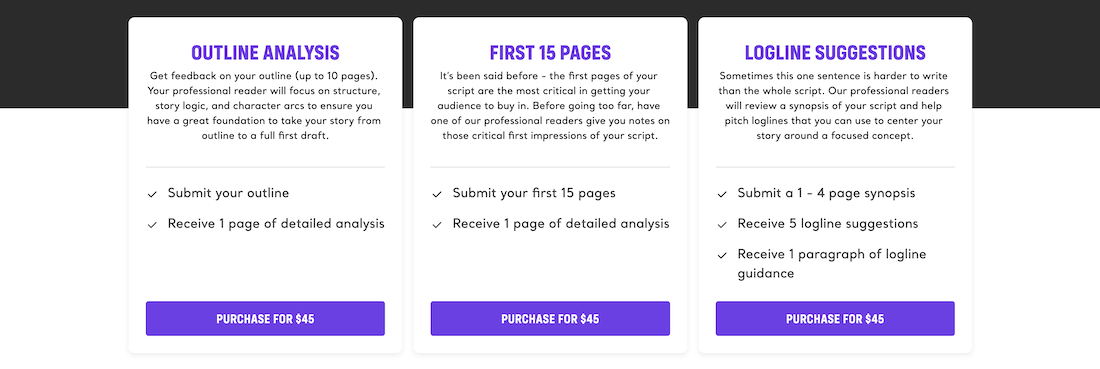9 Tips on How To Be a Pro Screenwriter Outside of Los Angeles

Let's start by saying that living in Los Angeles offers a pro screenwriter multiple advantages compared to those who do not.
- You can be readily available for meetings with agents, managers, producers, and development executives.
- You can attain Film/TV industry jobs at production companies, studios, and networks that help you break into the industry and make networking contacts.
- You can take advantage of the WGA Foundation Library (the best place worldwide for screenwriters to write).
Without question, living in Los Angeles and the California area gives screenwriters an edge over those living in other states. However, especially today, you don't need to live in Los Angeles to be a professional screenwriter. You may face better odds of success living in and around Los Angeles, but there are many avenues of opportunity available to those that can't or choose not to.
With that in mind, here we offer key tips and perspectives for those pursuing their screenwriting dreams and goals outside of Los Angeles. First, let's learn a little about the person (me) giving you this advice.
I'm a Pro Screenwriter Living in the Midwest
Full disclosure—I did live in the Los Angeles area from 1999 to 2006. During that time, I worked my way up from the bottom of the film industry ladder (movie extra and movie studio security guard) to the middle of the ladder in development (studio script reader and story analyst). However, it wasn't until I moved back to my home state of Wisconsin to raise my children closer to family that I signed my first professional contract with a major studio.
My Hollywood Days
I moved to California with my wife to pursue my screenwriting passions. I became a movie extra to get on major Hollywood sets to learn what it was like on set and experiencing the magic of filmmaking. When we were relocating to a more central location in Los Angeles, we stumbled upon an apartment that was too small and too expensive, but we discovered that it was right across the street from Sony Studios (which happens to be the old MGM lot of Hollywood Golden Age lore).
I tried to get entry-level studio jobs in the facilities and corporate levels, but nothing was happening. My daily routine included a jog around the studio perimeter a few times. I would peer into each gate, hoping to catch a glance at some movie magic. I would also see those coming in and out of the gates with their Sony ID badges, longing for the chance to have my own badge so I could come and go through a major movie studio as I please.
One day, fed up and frustrated, I walked over to a security guard and asked how I could get a job on the lot. Two weeks later, I was a Sony Security Officer.
It was monotonous work, but that didn't matter. I had near-free reign on a studio lot. I worked my way up to the VIP North Thalberg gate (now known as the Madison Gate). And I had the opportunity to meet the likes of Arnold Schwarzenegger, Stan Lee, Nathan Fillion, Harrison Ford, and so many others.
I worked my way into an office job, eventually becoming a studio liaison working with incoming productions and executives. I talked my way into a script reader/story analyst job, which became my greatest education in screenwriting.
In 2005, we had our first son, Jack. We decided I should stay at home with him (daycare costs were just as much as I was making in security) and focus on my screenwriting.
After writing my first few scripts during all of this, I finally wrote a spec that drew the attention of a major studio. It tracked well enough that an executive told their manager friend they should represent me. This led to multiple studio meetings. While the script didn't sell, I had momentum. I was repped, and I had some meetings under my belt. And what does one do in that situation? Decide to move back home to the Midwest.
Back in the Midwest
Priority one was family. And my manager at the time told me that I didn't need to be in Los Angeles to write—as long as I could fly back for meetings.
I wrote my second notable script, which was sent out wide, garnering the attention of Lionsgate. They offered me a development deal, paying for the option of the script while also leaving an open door for a script I was writing for their horror division. It was official—I was a pro screenwriter. And one living 2,000 miles away from Los Angeles.
Sadly, the 2007/2008 double punch of the WGA strike and economic collapse shattered hopes of my Lionsgate projects seeing the light of day in production. The industry was going through a lot of changes. My manager and I went our separate ways.
A couple of years later, now unrepresented, I was hired by a Los Angeles-based producer to do a page-one rewrite for a miniseries they had already sold to foreign territories. Blackout would eventually star the likes of the late Anne Heche, James Brolin, Bruce Boxleitner, Eric La Salle, Sean Patrick Flanery, and Haylie Duff.
In 2017, I was hired to write an indie flick entitled Hunter's Creed. It was a found-footage thriller with faith-based themes that featured Dwayne "Dog" Chapman and attained a release on DVD/Blu-Ray and Amazon Prime.
In late 2020, I connected with an executive at a Canadian production and distribution company specializing in Lifetime thrillers and rom-coms. The following two and a half years led to seven (so far) contracts and six produced Lifetime thrillers—two directed by Blackout star Haylie Duff.
Remember that none of the contacts that led to my Midwest-era pro screenwriting success after the Lionsgate deal originated from any Los Angeles-based leads from the past.

'Hunter's Creed' (2020)
Tips on How to Screenwriter Outside of Los Angeles
OK, let's get to the topic at hand. Hopefully, you understand that my story is just one of the thousands of pro screenwriters seeing success outside of the Los Angeles area.
It's possible to enjoy a career in screenwriting beyond Hollywood. Here are some tips from the trenches to help those who either can't move to Los Angeles or are unwilling to.
If You Want to Write for Television/Streaming, You Need to Live in L.A.
There's no way around this: To be part of a writers' room for a series, you must live in Los Angeles or whatever major city a writers' room is in (New York, Atlanta, Vancouver). Most screenwriters looking to get into series work believe they can sell their TV pilot on spec and make a living as a show creator. That's not how it works.
Read More: The Difference Lifestyles of Feature Screenwriters and Television Writers
Build a Stack of 3-5 Amazing Feature Spec Scripts
Let's highlight the word amazing. The worst thing you can do is try to sell your first (or even second) screenplay. You're still learning how to write cinematic scripts at this stage. While some have lucked out and written an outstanding first script, most screenwriters take a few scripts to understand the basic guidelines and expectations when it comes to:
- Story
- Narrative
- Characterization
- Structure
- Pacing
- Format
Marketing those early scripts can burn networking bridges you've worked hard to build. It's best to take a couple of years to get three to five screenplays that have proven to be buzz-worthy through major contest/fellowship placements or those you believe are ready after taking at least a couple of years to learn and understand those basic guidelines and expectations industry insiders have when it comes to spec scripts they consider.
Read More: The Differences Between Screenwriting Rules, Guidelines, and Expectations
Query Managers, Not Agents
Agents don't take on undiscovered clients. They come into play when there is a contract to be negotiated. Until you get to that point, managers are the ones that you should be targeting:
- Managers help develop your writing and career.
- They ready your script for submission.
- They submit your work to studios, networks, streamers, production companies, and, yes, agencies.
And as you begin your query process, focus on managers with clients with significant credits as opposed to those with none.
Read More: How to Sign with a Manager (And Agent)
You Don't Need Representation to Be a Pro Screenwriter
Sure, having a manager or agent makes the process of becoming a pro much easier. However, attaining them without any industry buzz surrounding your script can be very difficult. So you need to do a lot of the marketing of your work on your own.
Believe it or not, many development executives and producers are open to reading and considering your queries. Yes, many companies have strict guidelines against accepting unsolicited queries. Still, you'd be surprised how many you can find willing to read a query email — and maybe even check out the script.
Read More: Writing the Perfect Query Letter for Your Scripts
Even when you nab some screenwriting assignments or sales, you don't necessarily need representation to sign on the dotted line. I've been an unrepresented pro screenwriter for over a decade. In fact, beyond that first Lionsgate option, I haven't paid a single commission to any manager or agent.
If you can get a manager or agent, by all means, go for it. But as long as you can read through a screenwriting contract and understand the ins and outs of them (and maybe have a lawyer take a peek at first), you're fine working on your own.
Don't Obsess Over Becoming a Writers Guild Member
In reality, most guild members don't make enough to retain guild membership. And a majority of paid pro screenwriters work for companies that are not guild signatories. You need to meet the requirements for membership and additional yearly requirements to maintain membership. And those requirements can be challenging for most to attain.
So, don't stress about guild membership. That will come at a time when the stars align, and you find yourself—and your writing—at the right time and place, with the right people ready, willing, and able to make a major studio, network, streamer, or production company deal happen.
Most pro screenwriters that write movies for Lifetime, Hallmark, Tubi, and other channels and platforms that produce a high volume of features per year are non-guild. The money isn't as good as guild contracts. However, there's much more work.
There's Plenty of Non-Guild Work Out There
Despite working under over a dozen professional contracts, I have never worked on a guild-signatory project. I continue to try to accomplish that feat. However, partly because of my geographical location, I find more opportunities with non-signatories companies.
The production companies that develop and package projects for Lifetime, Hallmark, Tubi, and many Direct-To-Streaming features are non-signatory. They need to hire non-guild screenwriters because their budgets can't afford them the opportunity to pay guild-regulated contracts.
Most Lifetime and Hallmark features are made in Canada or financed by Canadian financiers. Thus, no guild regulations apply.
If you're looking for work as a non-guild screenwriter, pay particular attention to those platforms and the production companies listed in the opening credits. Those are the places to target in your queries to pitch yourself for future assignments.
- Conduct thorough research to gather information
- Explore cable/satellite VOD, Amazon Prime, Netflix, iTunes, and other streaming platforms
- Navigate through the action, thriller, horror, and science fiction genres
- Continue scrolling beyond the popular studio films to access the extensive collection of VOD/Direct-To-Streaming titles
- Identify the production companies responsible for creating these titles
- Query the production companies
Read More: How Screenwriters Pitch, Sell, and Write for Lifetime
Plan Los Angeles Trips Wisely
Any time you can meet industry contacts you've made face-to-face in the Los Angeles area is vital in creating relationships and opportunities to make the jump to major studio, network, and streamer jobs. While you don't necessarily need to live in Los Angeles to make a career out of screenwriting, it's good to get out there as much as possible.
- Plan a week-long trip where you can fit as many meetings in as possible
- Look for cheap flights to make that trip more affordable
- Use Airbnb to find more affordable and convenient places to stay
- Rent a car or use services like Uber or Lyft to get around town
Embrace Zoom Meetings
If anything good came out of the pandemic for screenwriters, it is the fact that Hollywood learned that they don't need as many face-to-face meetings. As the country opened up, face-to-face meetings have returned. However, Zoom meetings are an excellent way for out-of-towners to get the necessary face time they otherwise wouldn't be able to have. And more and more industry insiders are open to the online option.
Read More: How Screenwriters Can Master the Hollywood Zoom Meeting
Don't Announce That You're Outside of Los Angeles
Our final tip is pretty simple—don't draw attention to the fact that you don't live in Los Angeles. As you market your scripts, avoid tipping them off that you're an out-of-towner.
- Don't mention anything about you living outside Los Angeles in your query emails
- Don't put phone numbers or addresses on your title pages (an email address is sufficient)
Let them fall in love with your work first. Then, you can let them know you're not in Los Angeles but are willing to travel. If you're hired to be part of a writers' room for a series, you will need to relocate, yes. But for features, if they love your script enough to consider buying it or if they love the writing enough to consider hiring you for an assignment, they'll look past your geographical location.

---
Thousands of professional screenwriters like myself make a career out of writing produced features while living outside Los Angeles. There are plenty of screenwriting jobs out there for all. You just need to find them (after you develop your screenwriting skills).
If you follow these tips, the odds of you becoming a pro screenwriter living outside of Los Angeles are more in your favor. Good luck!
Read More: Are You Truly Prepared for Success as a Screenwriter?
Check out our Preparation Notes so you start your story off on the right track!

Ken Miyamoto has worked in the film industry for nearly two decades, most notably as a studio liaison for Sony Studios and then as a script reader and story analyst for Sony Pictures.
He has many studio meetings under his belt as a produced screenwriter, meeting with the likes of Sony, Dreamworks, Universal, Disney, and Warner Brothers, as well as many production and management companies. He has had a previous development deal with Lionsgate, as well as multiple writing assignments, including the produced miniseries BLACKOUT, starring Anne Heche, Sean Patrick Flanery, Billy Zane, James Brolin, Haylie Duff, Brian Bloom, Eric La Salle, and Bruce Boxleitner, the feature thriller HUNTER'S CREED, and many produced Lifetime thrillers. Follow Ken on Twitter @KenMovies and Instagram @KenMovies76.
Tags
Get Our Screenwriting Newsletter!
Get weekly writing inspiration delivered to your inbox - including industry news, popular articles, and more!































